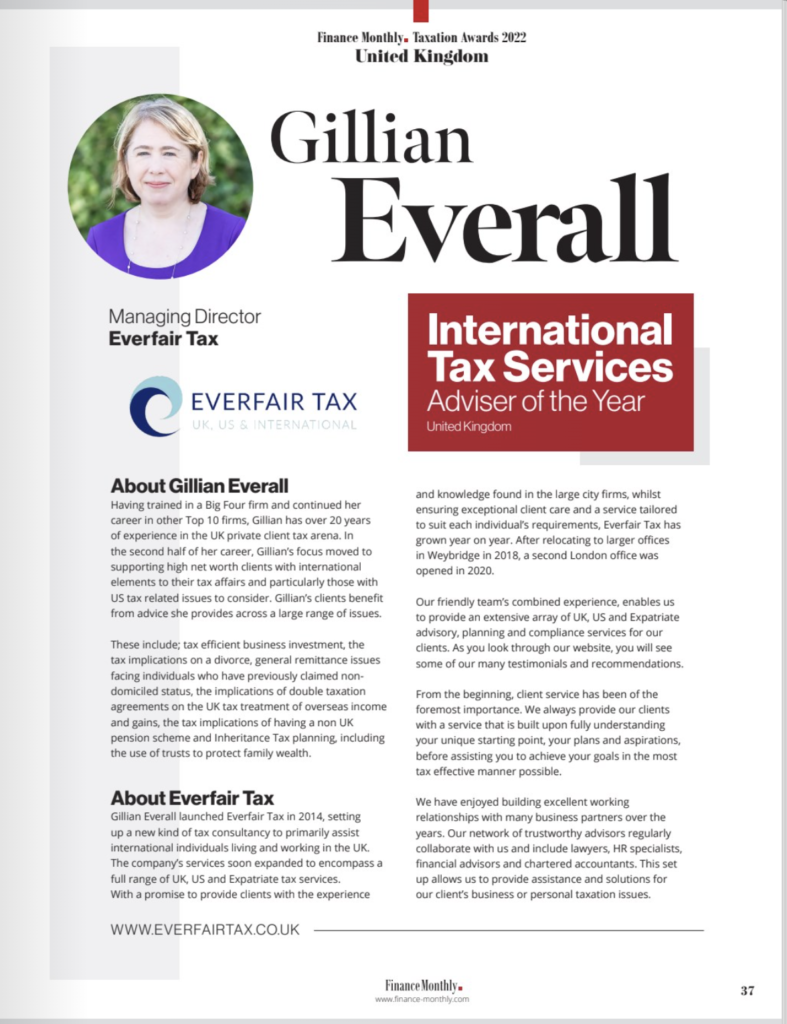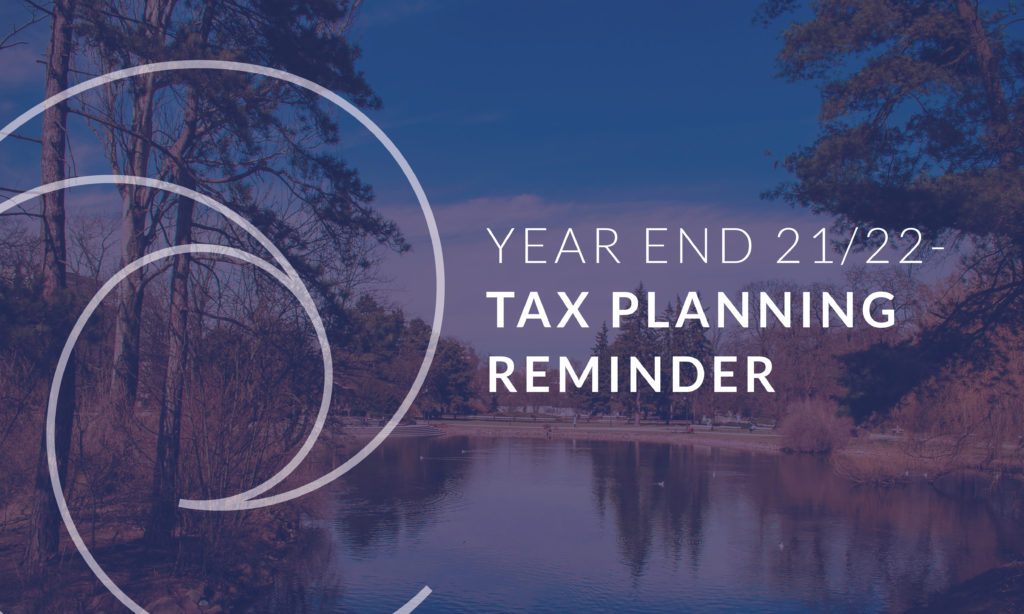Owner Managed Business Series: Transatlantic Moves (US & UK) and the US Tax Impacts

There are numerous reasons why you may consider a transatlantic move – work, love, family. Whatever the driving forces, there are undoubtedly many factors to consider, particularly as a business owner. Business owners must assess both business and personal impacts, especially if operating from both sides of the Atlantic.
The Transatlantic Move: Series Explanation
There are three articles in our Transatlantic move series. This series of articles will consider the tax impacts of moving between the US & UK as a business owner. They will focus on various tax issues and implications for the individual owner and their business. Thereby, highlighting areas of potential adverse and double taxation for business owners looking to make a transatlantic move.
Each article aims to provide an overall awareness and potential impacts of the highlighted tax areas. It is not a comprehensive analysis or specific tax advice. They are based on the tax law in place at the date of the articles.
Each individual situation is unique. You may feel that you potentially fall into the areas discussed within these articles. As such, you are advised to take specialist advice which considers your particular facts and circumstances. At Everfair, our specialist team of US & UK tax advisors work with high-net-worth individuals, trusts, and owner managed businesses. We can advise you in planning your affairs to maximize the tax efficiency on both sides of the Atlantic.
The Transatlantic Move: Series Breakdown
- The first article examined general areas of consideration for a British business owner moving to the US. It focused solely on their individual tax matters.
- The second article will focus on moving to the US with an established UK business. It will address various tax issues and implications to the business and its owner.
- The third article will focus on moving to the UK with an established US business. It will address various tax issues and implications to the business and its owner.
Article 2: Moving to the US with an Established UK Business
The second article in our owner managed business series focuses on moving to the US with an established UK business. It considers the US tax impacts and implications to the business and its owner.
Moving to the US with an existing UK business will require careful thought and planning. The primary purpose and length of your stay will drive how you structure your business in the US & UK. You will want to minimize unnecessary administrative burdens and avoid adverse or double taxation upon your move to the US.
The Transatlantic Move to the US with an Established UK Business: Summary
This article explores the potential US tax implications when moving to the US with an established UK business. It will cover the following areas:
- How the business and its owner will be taxed in the US
- Points to note when setting up a US entity
- State income and sales tax implications
- Minimizing double taxation by highlighting certain non-US friendly company structures
US Taxation of an established UK Limited Company and its Owner
The UK limited company is generally the most common vehicle when setting up a business in the UK. The company files separate accounts and tax returns with HMRC. The owner is taxed upon distribution, mainly through salary or dividends. For purposes of this article, we will consider a UK limited company that is owned 100% by a single owner. We will consider the US tax implications of moving to the US with an established UK business for both a:
- British national business owner moving to the US
- US citizen, UK resident business owner moving back to the US
British National Business Owner Moving to the US
Upon becoming US tax resident, the British business owner will be subject to US personal income tax reporting. This includes informational reporting in relation to any non-US company interests. The UK company profit may be subject to tax on an annual basis at the owner’s effective ordinary tax rates. This is subject to the extent the UK company has profits sourced outside the US, absent any US tax elections. This is different from the tax treatment reported in the UK which is based on distributions rather than company profit.
The UK company will likely be deemed doing business in the US, especially if the owner is performing services there. It will become subject to its own income and payroll tax reporting and filing requirements. The company will be taxed at the current Federal corporate tax rate of 21%. The company may also be subject to state tax filing and reporting which we will cover later in this article.
US Citizen, UK Resident Business Owner Moving back to the US
US citizens are subject to tax and reporting on a worldwide basis, regardless of where they are living. Therefore, a US citizen business owner living in the UK will have already been subject to annual US tax reporting. They will also have been subject to US tax reporting in relation to their UK company interest. Their reporting obligations will continue upon moving back to the US.
The US citizen business owner may also have made certain US tax elections whilst living in the UK. These elections may have been made to mitigate the potential for double taxation. A discussion of these various elections is beyond the scope of this article. These elections may have been beneficial whilst living in the UK. However, they should be reviewed if they will continue to be tax-efficient whilst living in the US.
The UK company will likely be deemed doing business in the US, especially if the owner is performing services there. It will become subject to its own income and payroll tax reporting and filing requirements. The company will be taxed at the current Federal corporate tax rate of 21%. The company may also be subject to state tax filing and reporting which we will cover later in this article.
Setting up a US Entity
At the onset, it may seem logical to set up a separate US entity upon moving to the US. In many cases, this may be the right decision. However, it is important to consider the situation in whole. A decision to set up a separate US entity should factor in your individual facts and circumstances. This will help determine the type of entity and ownership structure needed in relation to your UK company. In certain cases, it may be determined that a UK entity is no longer needed. In this instance, you may consider winding up your UK company prior to moving to the US.
Some key factors to be considered in the initial analysis include the following:
- Length and purpose of your stay
- Where you will conduct business
- Where your clients are located
- Short and long-term growth plan of the business
- The amount of time you will be spending in the US and UK
- Where your employees will be located
- Are you looking to attract outside investors?
- What is the timing and exit strategy?
Other areas to consider include pension and healthcare for yourself, your family, and your employees. You may also want to consider tax planning for retirement.
Dependent on your individual situation, there are a variety of entity options available in the US. Each option has varying levels of reporting, setup, and tax implications. For individuals with a footprint in both the US and UK, the level of reporting will likely increase.
State Tax Considerations
Another important area to consider when moving to the US with an established UK business is state tax. Each state has different rules to determine if you are transacting business (creating nexus) in the state. This can result in additional registration, filing and tax implications, despite having no physical presence in that state.
The two general areas of consideration from a state tax perspective are:
- Income tax
- Sales tax
State and Local Income Tax Nexus/Economic Nexus
The first consideration for state and local tax is nexus for income tax purposes. Each state has their own set of criteria and/or revenue thresholds. Certain local jurisdictions such as New York City and the City of San Francisco also have separate thresholds. These thresholds apply to the following:
- Performing/providing services to clients located and deriving benefit of the services within the state or local jurisdiction
- Sale of physical or digital products to customers located and deriving benefit within the state or local jurisdiction
Initially, where you live and perform your services may trigger business state registration and filing for income tax purposes. Depending on the state and type of business entity, sales can be sourced to a state based on either:
- Customer location
- Where the services are performed
Certain states such as Massachusetts and New York have revenue thresholds which will trigger economic nexus for income tax purposes. The current thresholds in Massachusetts and New York are:
- Massachusetts – annual sales (on a calendar year basis) greater than $500K.
- New York – annual sales (on a calendar year basis) greater than $1,138,000.
Not all states operate based on annual revenue thresholds. Income tax nexus can instead be based upon having employees, property, or an office in the state. State corporate income tax rates vary. They can range from zero to 11.5% depending on the state and local jurisdiction. Certain locales such as New York City assess their own local tax to companies and individuals.
State and Local Sales Tax Nexus
Sales tax is a separate class of tax similar to VAT. It can be assessed at a state or local level on certain types of sales and services. The threshold to trigger sales tax can vary but is generally $100K of sales. Once nexus is established, it will require company registration and collection of sales tax from customers. The tax collected is remitted to the state and applicable local jurisdictions by filing sales tax returns.
States are closely monitoring companies that sell or provide services into their state and assessing harsh penalties for non-compliance. Therefore, it is important to review the rules to determine if your business will trigger nexus for sales tax purposes.
Minimizing Double Taxation
A review of the company structure and US tax classification should be conducted in advance of moving to the US. Certain US tax elections may have optimized the tax efficiency for a US citizen living in the UK. However, it may not be tax efficient when living in the US. Therefore, to minimize any potential for double taxation, you should speak with a US tax specialist prior to moving.
Potential Pitfall: Non-US Friendly Company Structures
In addition, below are two tax traps to be aware of:
1 – UK Investment Company
If either of the following apply, you may be subject to a punitive taxing regime in the US:
- You own an interest in a UK investment company or
- Your UK company holds investments or assets which generate passive income such as interest, dividends, or rental income
If either of the above apply, it is advised to consult a US tax specialist prior to your move. This will ensure that any potential areas of double taxation or adverse tax implications are identified and mitigated.
2 – US Limited Liability Corporation (LLC) or S-Corporation
The US LLC is a popular vehicle in the US due to its flexibility and relatively simple set-up. Whilst it is a corporate entity for legal purposes, it is taxed as a transparent entity in the US. It also has minimal initial and annual filing fees compared to incorporation. The income of the LLC is passed through to its owner(s) annually and is reported on their personal tax return(s). The LLC owners can then draw distributions from the LLC tax free up to the amount previously taxed or contributed.
The S-corporation is another hybrid entity that is often utilized by small business owners in the US. S-corporations have certain tax advantages unavailable to an LLC or corporation. Similar to an LLC, it is a corporate entity for legal purposes but is taxed as a transparent entity. The income of the S-corporation passes through to its owner(s) annually and is reported on their personal tax return(s).
Whilst resident in the US, these entities may be tax efficient. However, as a UK resident, it may cause potential double taxation. The UK will tax the owner upon distribution as it views these entities as opaque, corporate bodies. As such, no corresponding credit for taxes previously paid in the US will generally be allowed in the UK.
Also, a change in residency status may trigger an automatic change in the status of the S-corporation. This may carry potential subsequent tax implications.
Therefore, it is important to take US tax advice if either of the below apply:
- You own an LLC or S-corporation and foresee moving back to the UK after a certain period
- You own an LLC or S-corporation and may be considered a UK tax resident during your time in the US
This will ensure any potential exposure to adverse or double taxation relating to your LLC or S-corporation is minimized.
Key Takeaway:
The above does not cover every tax consideration when moving to the US with an established UK business. However, it highlights the importance of reviewing your overall company structure with a US tax specialist prior to your move. This will ensure that any potential areas of adverse or double taxation are identified and minimized.
At Everfair, our specialist team of US & UK tax advisors work with high-net-worth individuals, trusts, and owner managed businesses. We can advise you in planning your affairs to maximize the tax efficiency on both sides of the Atlantic.
Stay tuned for our third and final article in this owner managed business series. The final piece will delve into the tax issues of moving to the UK with an established US business.
Written by Sara Kim









